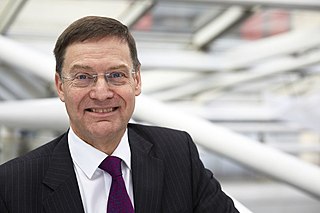
A teacher, also called a schoolteacher or formally an educator, is a person who helps students to acquire knowledge, competence, or virtue, via the practice of teaching.
Education in England is overseen by the Department for Education. Local government authorities are responsible for implementing policy for public education and state-funded schools at a local level. State-funded schools may be selective grammar schools or non-selective comprehensive schools. All state schools are subject to assessment and inspection by the government department Ofsted. England also has private schools and home education; legally, parents may choose to educate their children by any suitable means.
The National Professional Qualification for Headship is a professional qualification for aspiring headteachers. The qualification was introduced in 1997 by the newly elected Labour government, following a commitment in their manifesto to introduce a mandatory qualification for head teachers. Initially voluntary, the first group of people were awarded the qualification in July 1998. The legal requirement and qualification became mandatory on 1 April 2004. Until 8 February 2012, holding the NPQH was a mandatory requirement for all newly appointed English and Welsh school head teachers. It is taught via blended learning at centres all over the country, and administered by the National College for Teaching and Leadership which has centres in Manchester, Nottingham, London, and Ruddington.

Teacher education or teacher training refers to programs, policies, procedures, and provision designed to equip (prospective) teachers with the knowledge, attitudes, behaviors, approaches, methodologies and skills they require to perform their tasks effectively in the classroom, school, and wider community. The professionals who engage in training the prospective teachers are called teacher educators.
The General Teaching Council for Scotland is a fee based registered charity and the world's first independent registration and regulation body for teaching. The current Chief Executive and Registrar is Pauline Stephen. The GTC Scotland maintains a register of qualified teachers and college lecturers; there were 80,695 teachers and college lecturers on the register on 31 March 2022.
The National Center on Education and the Economy (NCEE) is an American not-for-profit education research, advocacy, and educator professional learning organization based in Washington, DC, that first formed in 1988 as the Carnegie Forum on Education and the Economy.

The General Teaching Council for England (GTCE) was the professional body for teaching in England between 2000 and 2012. The GTC was established by the Teaching and Higher Education Act 1998 which set two aims: "to contribute to improving standards of teaching and the quality of learning, and to maintain and improve standards of professional conduct among teachers, in the interests of the public". The GTC was abolished in 2012 with some of its functions being assumed by the Teaching Agency, an executive agency of the Department for Education, which in 2013 became the National College for Teaching and Leadership.
The Self-review Framework is an online tool that schools in the United Kingdom can use to assess and benchmark their use of technology (ICT). It enables schools to identify where they are and shows the practical steps they can take to improve their use of technology. The Self-review Framework provides a structure for reviewing a school's use of technology and its impact on school improvement. It is designed to support ALL schools. It complements the work schools currently undertake for Ofsted and can be provided as evidence for a school's Self Evaluation Framework (SEF).
A professional degree, formerly known in the US as a first professional degree, is a degree that prepares someone to work in a particular profession, practice, or industry sector often meeting the academic requirements for licensure or accreditation. Professional degrees may be either graduate or undergraduate entry, depending on the profession concerned and the country, and may be classified as bachelor's, master's, or doctoral degrees. For a variety of reasons, professional degrees may bear the name of a different level of qualification from their classification in qualifications, e.g., some UK professional degrees are named bachelor's but are at master's level, while some Australian and Canadian professional degrees have the name "doctor" but are classified as master's or bachelor's degrees.
St John the Baptist School is a coeducational Catholic secondary school and sixth form in Woking, Surrey, England. The school was one of the first 100 designated teaching schools in the UK.

A certified teacher is an educator who has earned credentials from an authoritative source, such as the government, a higher education institution or a private body or source. This teacher qualification gives a teacher authorization to teach and grade in pre-schools, primary or secondary education in countries, schools, content areas or curricula where authorization is required. While many authorizing entities require student teaching experience before earning teacher certification, routes vary from country to country.
The Institute for Learning (IfL) was a voluntary membership, UK professional body. It ceased operating on 31 October 2014. Although precise membership figures and statistical details had been removed from IfL's webpage prior to its closure, at the end of financial year 2013-2014 IfL were reported as having only 33,500 of their 200,000 members remaining.
A school business manager (SBM), sometimes known as a school business leader (SBL) or bursar, is a senior member of non-teaching staff responsible for managing non-teaching activity in a school. This position exists in schools in the United Kingdom, but not in most public schools in the United States. They oversee the business management of schools – all the administrative and logistical aspects of running a school so that these are done in the most effective and efficient way possible. Through this, they free up the school's headteacher to focus on leading teaching and learning.

The Department for Education (DfE) is a department of His Majesty's Government responsible for child protection, child services, education, apprenticeships, and wider skills in England.
Huxlow Academy is a secondary school and sixth form with academy status, located in Irthlingborough, Northamptonshire, England. Previously a specialist Science College, the school converted to academy status in April 2012. However, the name only changed to Huxlow Academy in late 2022.There are just over 900 students on roll, including around 100 students in the Sixth Form, which is shared with two other local schools.
The Trojan Horse scandal, also known as "Operation Trojan Horse" or the Trojan Horse affair, is a conspiracy theory that posits a plot to introduce an "Islamist" or "Salafist" ethos into several schools in Birmingham, England. The name, based on the Greek legend, comes from an anonymous letter sent to Birmingham City Council in late 2013, alleged to be from Birmingham "Islamists" detailing how to wrest control of a school, and speculating about expanding the scheme to other cities. The letter was leaked to the press in March 2014. Around a month later, Birmingham City Council revealed that following the letter release it had received hundreds of allegations of plots similar to those described in the letter, some claims dating back over 20 years.
Barnett Berry is a research professor at the University of South Carolina, where he is the founding director of Accelerating for Learning and Leadership for South Carolina (ALL4SC) — an initiative launched in 2019, to marshal the resources of an entire R1 institution of higher education in service of high need school communities. Barnett's career includes serving as a high school teacher, a social scientist at the RAND Corporation, a professor at UofSC, a senior state education agency leader, and senior consultant with the National Commission on Teaching and America's Future, leading its state partnership network. From 1999 to 2018, Barnett led Center for Teaching Quality website, a non-profit he founded to conduct research and ignite teacher leadership to transform the teaching profession and public education for more equitable outcomes for students. Barnett has authored a wide array of over 120 policy and research reports, journal articles, and commissioned papers. His two books, TEACHING 2030 and Teacherpreneurs: Innovative Teachers Who Lead But Don't Leave, frame a bold vision for the profession's future. He is the 2021 recipient of the James A. Kelly Award for Advancing Accomplished Teaching from the National Board for Professional Teaching Standards and is a policy advisor for the Learning Policy Institute.

Professor Sir Chris Husbands is a British academic, educationist, university leader and public servant, who has been Vice-Chancellor of Sheffield Hallam University since January 2016.

Educational management refers to the administration of the education system in which a group combines human and material resources to supervise, plan, strategise, and implement structures to execute an education system. Education is the equipping of knowledge, skills, values, beliefs, habits, and attitudes with learning experiences. The education system is an ecosystem of professionals in educational institutions, such as government ministries, unions, statutory boards, agencies, and schools. The education system consists of political heads, principals, teaching staff, non-teaching staff, administrative personnel and other educational professionals working together to enrich and enhance. At all levels of the educational ecosystem, management is required; management involves the planning, organising, implementation, review, evaluation, and integration of an institution.

The Minister of State for Schools, formerly the Minister of State for School Standards and Parliamentary Under-Secretary of State for School Standards, is a mid-level position in the Department for Education in the British government.









